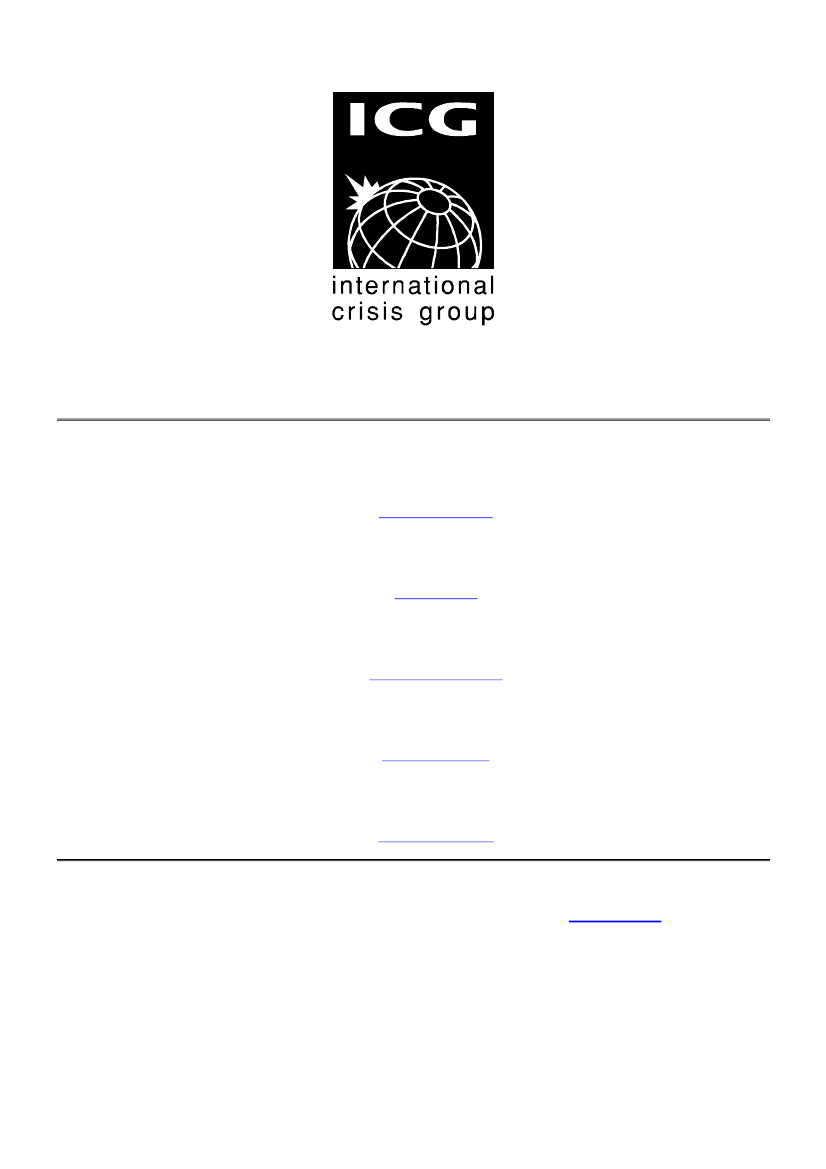Det Udenrigspolitiske Nævn 2004-05 (1. samling)
Bilag 26
Offentligt
MIDDLE EASTBriefingAmman/Brussels, 23 December 2004
AFTER ARAFAT? CHALLENGES AND PROSPECTSI.OVERVIEWstatement notwithstanding, the "heart of the matter" isnot nor has it ever been Palestinian reform. Defects inPalestinian democracy (by almost every measure lesssignificant than in every other Arab country) did notcause the Israeli-Palestinian conflict any more thanaddressing them will resolve it. While internationalsupport for Palestinian reform is welcome, it ought notcome at the detriment of simultaneous moves on thepolitical front, lest the new Palestinian leadershiprapidly lose whatever legitimacy elections will bring.There is, in other words, a danger of excessivecomplacency generated by the current harmony. Thatthe relative calm and goodwill is vulnerable already isevident in the mounting toll of Palestinian and Israelicasualties, which could yet imperil the electoralprocess.3It will prove transient if efforts to embedit within a clear and defined political horizonaccompanied by concrete changes on the ground arenot actively pursued.The challenges posed by the Palestinian transitioncan be grouped into several categories:The new Palestinian leadership will have toearn its legitimacy from the Palestinianpeople. Given the weak and discredited natureof Palestinian Authority (PA) institutions, thepresidential poll is necessary but insufficient.
In the weeks since Yasir Arafat's death on 11November 2004, the Palestinian leadership hasundergone a surprisingly smooth and orderlytransition. Israeli-Palestinian as well as Palestinian-Arab and Arab-Israeli relations are witnessing levelsof cooperation and coordination not seen in years.1International efforts to jumpstart the peace process arevisible once again, with those previously debatingwhether attempts should be made to defuse theongoing crisis now discussing how best to do so. Still,the extent to which these dynamics present anopportunity for peace remain uncertain and willdepend on whether visible efforts to rejuvenatePalestinian institutions are accompanied by renewedcommitment to repairing Israeli-Palestinian relationsand moving toward a viable, comprehensive peace.Timing and sequencing will be key. All relevantparties -- Palestinian, Israeli, American, Arab andEuropean -- are in agreement that the transitionprocess and the reconstruction of Palestinianinstitutions is a priority; the immediate focus,therefore, naturally is on the 9 January presidentialelection. The Palestinian decision to conduct this pollwithin the 60 days prescribed by Palestinian Authority(PA) legislation and associated commitments andIsrael's assurance that it will facilitate the eventrepresent hopeful starts.2But, President Bush's
In December 2004 PLO Chairman Mahmoud Abbas (AbuMazen) paid official visits to Syria, Lebanon, and Kuwait,repairing ties that had been strained to the point of non-existence for over a decade. A prisoner exchange, economicprotocol, and other measures that same month also pointed toa noticeable thaw in Egyptian-Israeli relations. SusanSevereid, "Egypt charts new course for Mideast peace",Associated Press, 15 December 2004.2Even on the electoral front, there is cause for concern. Asof 10 December 2004, Israeli soldiers had roughed up PApresidential candidate Mustafa Barghouti at a roadblock anddetained a second, Bassam Salhi, on the outskirts ofJerusalem. A third, Hassan Khreisheh announced hiswithdrawal from the contest, citing unacceptable Israeli
1
restrictions on his movement and his inability to obtain apermit to campaign in the Gaza Strip.3Arafat's final weeks and the period immediately followinghis death were among the least violent since September2000. Late November 2004, however, witnessed a gradualescalation, particularly in the Gaza Strip, initially limited toIsraeli assassination of Palestinian militants and Palestinianattacks on Israeli military installations and settlements. Bymid-December, with each side blaming the other for thedeterioration, matters in the Gaza Strip had reverted to form.Palestinians conducted a series of sophisticated attacksagainst Israeli positions within Gaza and once again shelledGaza settlements and the Israeli town of Sderot; Israellaunched several armoured incursions into Palestinianpopulation centres. The death toll from 1 November through20 December stands at approximately 45 Palestinians andten Israelis dead.
After Arafat? Challenges and ProspectsCrisis Group Middle East Briefing, 23 December 2004
Page 2
Local elections, scheduled to begin on 23December 2004 in several West Banklocations, and legislative elections, expected tobe announced for mid-2005, are no lessimportant. These will need to conducted withthe participation of the opposition and be freeof violence and obstruction.4The new leadership will not be able to operatewithout the support of the Palestinian politicalsystem and will, therefore, need to revitalise it inorder to lead. In addition to the above elections,this means conducting internal primaries withinthe dominant Palestinian National LiberationMovement (Fatah) to choose delegates to its sixthGeneral Congress scheduled for 4 August 2005,and the latter's election of a new and morerepresentative leadership. In addition, it entailsintensified efforts to incorporate the IslamicResistance Movement (Hamas) and PalestinianIslamic Jihad (PIJ) into the Palestinian politicalsystem -- ideally through the institutions of thePalestine Liberation Organisation (PLO) -- on thebasis of a strategic consensus that is consistentwith a negotiated two-state settlement and amutual cessation of attacks against civilians, andto which its adherents are held accountable.Democratic and organisational legitimacy willnot absolve the new leadership of the requirementto deliver results; as a Palestinian observerexplained: "in our system, elections confirmlegitimacy, they don't create it. Abu Mazen wasselected because of his institutional status, and, ifelected, he will last because of his achievements.Elections are just one part of this equation".5Rapid and tangible progress will be expected interms of law and order as well as economic well-being, as will concrete evidence of a halt tofurther settlement expansion, Israel's release ofprisoners, loosening of Israeli restrictions onmovement and a credible diplomatic process.How the Gaza disengagement initiative isimplemented in 2005, and what follows it, willbe a critical test in this regard. Of course, noneof this will be sustainable without a mutual andvisible reduction in violence.
The international community's approach shouldproceed from the premise that a successfultransition, end of the violent confrontation,changes on the ground and revival of the peaceprocess are organically linked rather than issuesthat can be sequentially and separately addressed.If progress is held up on any of these fronts, thelikelihood is that none will be satisfactorilyachieved.As preparations for the January 2005 electiondemonstrate, the current environment is one in whichPalestinians must lead if the transition is to succeed.But they cannot do so unless enabled by Israel and theinternational community. After four years of conflictthere are too many factors beyond the PA's control forit to be otherwise. The onus is upon all the parties,and particularly upon those who have proclaimed thenew reality in the Middle East a fresh opportunity.
II.
MULTIPLE VOIDS
The void created at the heart of the Palestinianpolitical system by Yasir Arafat's demise is bestexplained by his unique popular stature, undisputedmonopoly over decision-making, and methods of ruleduring nearly four decades at the helm of the nationalmovement.6
A.
ARAFAT'SUNIQUEPOSITION
For the vast majority of Palestinians, Arafat's leadingrole in the rebirth of the Palestinians as a people afterthenakba(catastrophe) of 1948 and the emergence ofthe contemporary national movement after 1967endowed him with personal political credit that on thewhole outweighed their criticisms of his policies andmethods. This attitude is best summed up in theexpression used by Fatah activists, "We disagree withhim but not about him".7To Palestinians, Arafat remains above all the leaderwho took a scattered and broken people, held them6
Crisis Group telephone interview, Yezid Sayigh, Palestiniananalyst, 8 December 2004. See further, Yezid Sayigh,"Palestinians must go to the polls",Financial Times,22November 2004.5Crisis Group telephone interview, Ramallah, December 2004.
4
For a comprehensive analysis of the development of thecontemporary Palestinian national movement and Arafat's role,see Yezid Sayigh,Armed Struggle and the Search for State: ThePalestinian National Movement, 1949-1963(Oxford, 1997).For an account of more recent developments, see GrahamUsher, "Facing defeat: The Intifada two years on",Journal ofPalestine StudiesXXXII: 2 (Winter 2003), pp. 21-40.7Crisis Group interviews, Fatah activists, West Bank, 2004.
After Arafat? Challenges and ProspectsCrisis Group Middle East Briefing, 23 December 2004
Page 3
together despite overwhelming odds and in the face ofrepeated Israeli and Arab attempts to subdue them,and successfully placed their struggle for self-determination at the centre of the international agenda,transforming refugee communities widely considereda humanitarian problem into a potent nationalliberation movement. In one of his last interviewsArafat indicated that this is also how he viewed hisown legacy: "We have made the Palestinian case thebiggest problem in the world.…107 years after the[founding 1897 Zionist] Basel Conference…Israel hasfailed to wipe us out. We are here, in Palestine, facingthem. We are not red Indians".8By the same token,his failure to establish an independent state isprimarily seen as reflecting Israeli and Americanhostility to Palestinian national aspirations rather thanhis shortcomings as a revolutionary and statesman.Perceiving him as the symbol and personification oftheir cause, Palestinians at critical junctures providedhim with the benefit of the doubt in ways that areunlikely to be extended to any successor. In the wordsof one Palestinian, "Whether you agreed with him ornot, it was never in doubt that Abu Ammar [Arafat]devoted his entire existence to Palestine".9"Becauseof his history", affirms an independent critic, "Arafatenjoyed immunity. He could never be accused oftreason on account of his concessions. With hissuccessors, this is no longer the case".10Arafat's standing among Palestinians was, in short,fundamentally personal and historical, and transcendedhis institutional position, organisational power, andelectoral mandate. If for Arafat a democratic mandatewas a welcome addition to his credentials with which toadmonish foreign critics and needle Arab counterparts,his successor cannot function without one. "Without apopular mandate", explains PA presidential candidateMustafa Barghouti, "a new leader won't be acceptedby the people, and will be considered someoneimposed by outside forces to serve their interests".11And where Arafat could all but ignore formalPalestinian political institutions even when makingdecisions as momentous as accepting the 1993 Osloagreement, his successors will need to reinvigorate
these weakened and marginalised structures in orderto legitimise their own strategic steps.A dedicated micromanager throughout his life, andwhose most senior colleagues and potential rivalswere almost all assassinated by Israel or Arab rivals,marginalised, or dead by the early 1990s, Arafatexercised undisputed "autocratic control overPalestinian security, financial, and political decision-making",12particularly as the years wore on. This notonly further weakened Palestinian institutions, butalso makes it unlikely that a single individual willpossess the requisite clout to replace him in thisrespect - or will be allowed to if he attempts to do so.In the view of a senior West Bank Fatah leader,"Arafat and the rule of law were incompatible. Nowthat Arafat is gone, it is time for the rule of law".13Repeatedly, in this respect, Palestinians emphasisethat "what was tolerated during the era of Yasir Arafatwill not be permitted after him".14Often suchwarnings are accompanied with critical references tothe monopolisation of decision-making (infirad).15Also part of Arafat's legacy is the pluralism thatbecame an integral part of Palestinian political lifeduring his stewardship. For all the talk about therequirement for democratic reform, it is hard todispute the fact that there is far more toleratedpolitical diversity and free speech in the Palestinianpolity than in any Arab counterpart. This traditionreflects both the objective reality that leadership andpolicy could not be forcibly imposed upon a dispersedpeople living under multiple sovereignties, as well asArafat's consistent preference for forging consensus,co-opting competitors, and outmanoeuvring ratherthan eliminating rivals. During Arafat's 35-year tenureas PLO Chairman, the only rival to have received adeath sentence (inabsentia)was Sabri al-Banna (AbuNidal), leader of the breakaway Fatah - RevolutionaryCouncil, in 1974. Even leaders of the 1983 Fatahrebellion against Arafat's leadership were not put ontrial, and several were later absorbed into the PA.The flip-side, as has been evident during the currentuprising, is that rival movements and even competing12
Al-Ahram Weekly715, 4-10 November 2004.Crisis Group interview, Palestinian resident, Ramallah, 12November 2004.10Crisis Group interview, Palestinian activist, Ramallah, 10November 2004.11Crisis Group interview with Mustafa Barghouti, Secretaryof the Palestinian National Initiative and PA presidentialcandidate, Ramallah, 11 November 2004.9
8
Crisis Group interview with Adnan Abu Odeh, Jordaniancommentator and analyst, Amman, 6 December 2004. Seefurther Sayigh,Armed Struggle,op. cit.13Crisis Group interview with a member of the FatahRevolutionary Council, Ramallah, 29 November 2004.14Crisis Group interviews with Palestinian activists, WestBank, November 2004.15Crisis Group interview with Mahmud Zahhar, Hamas leader,Gaza City, 23 November 2004.
After Arafat? Challenges and ProspectsCrisis Group Middle East Briefing, 23 December 2004
Page 4
Fatah factions have been subject to neither strategicnor tactical discipline. Rather, Arafat sought toinfluence and control them through a combination ofpatronage, utilisation of his personal stature, andselective repression made possible by his personalprestige. The new leadership will by contrast have farless access to such mechanisms and likely be far lessadept at using them, while being even less capable offorcibly eliminating detractors. At the outset at least,it will need to negotiate understandings with thespectrum of Palestinian forces, most prominentlyHamas, "which now has the power of veto overPalestinian decision-making and the capacity tosabotage initiatives taken without its consent",16aswell as the increasingly fragmented Al-Aqsa Martyrs'Brigades affiliated with Fatah.17
of this transition process and will not concludeit. The most important positions held by Arafatin this respect were the following:Chairman of the Executive Committee of the PLO.Established in 1964 and led by Arafat since 1969, thePLO rather than the PA remains the supreme organ ofthe national movement, as well as the internationally-recognised representative of the Palestinian people andthe formal Palestinian interlocutor in the peace process.The PLO counts the leading nationalist and leftistpolitical movements18but not the Islamist organisationsas constituent members. Seats on its decision-makingbodies, including the fourteen-member ExecutiveCommittee (EC), the 200-member Central Council(CC), and the larger Palestine National Council (PNC),19are apportioned between its member organisations --and in the case of the PNC also subsidiary institutions-- on a quota basis that makes room for a sizeableproportion of unaffiliated independents and takesgeographical diversity into account.20Pursuant to PLO by-laws, its Chairman is appointedby the EC rather than elected by the PNC.21On 11November 2004 Mahmoud Abbas (Abu Mazen), theEC's Secretary since 1996, was unanimously chosenby its members to replace Arafat. Although it isexpected that the CC and PNC "will in due course be
B.
ARAFAT'SMANYPOSTS
Arafat monopolised key posts within the nationalmovement's political institutions. In a telling incidentdating from the 1990s, he reportedly responded to acritic who had accused him of monopolising decision-making:I consulted with the President of the State ofPalestine, the Chairman of the ExecutiveCommittee of the PLO, the President of the PA,the Commander-in-Chief of the PalestinianArmed Forces, the head of the National SecurityCouncil, the Minister of Interior, and severalother officials -- all of whom were of courseArafat himself. In light of this, and on accountof the political system's diffuse structure, thesuccession will be a more complex affair thanreplacing a head of state or organisational leader.The PA presidential election scheduled for 9January 2005 is, therefore, only one component
18
16
Crisis Group interview, Hani Masri, Palestinian analyst andcommentator, Ramallah, 10 November 2004. Crisis Groupinterviews, Hamas leaders, Gaza Strip, November 2004,confirmed this analysis.17As one minor example of the Brigades' lack of discipline,a statement attributed to the Al-Aqsa Brigades on 12November 2004 announcing that they would be changingtheir name to the Martyr Abu Ammar Brigades in honour ofthe late Palestinian leader was later discounted by Brigadecommanders. Crisis Group interview, Zakaria Zubaidi, Al-Aqsa Martyrs' Brigades commander, Jenin, 15 November2004. For more on the growing fragmentation within theBrigades, see Crisis Group Middle East Report N�32,WhoGoverns The West Bank: Palestinian Administration underIsraeli Occupation,28 September 2004, pp. 22-28.
Most prominently Fatah, the Popular Front for the Liberationof Palestine (PFLP), the Democratic Front for the Liberation ofPalestine (DFLP), the Palestinian People's Party (PPP), thePalestinian Democratic Union (FIDA), the Palestinian PopularStruggle Front (PPSF), and several smaller organisations.19Akin to a parliamentary body, the PNC's size has variedconsiderably over the years. Currently counting approximately600 members, most of whom hail from the Palestiniandiaspora, its consistent expansion since the 1980s reflects thereduction of its policymaking role and growth as an instrumentof patronage that serves primarily to endorse rather than debateleadership decisions. Recent proposals to limits its size toapproximately 300 members equally apportioned betweenresidents of the occupied territories and representatives of exilecommunities have not yet been ratified. The Central Councilperforms an intermediate function between the EC and PNC.20The leadership of PLO subsidiary institutions, such as thegeneral unions representing workers, women, and writers, aretypically controlled by member organisations on a quota basis.Unaffiliated independents within the PLO have generallysupported Fatah policies, which helps explain their prominencein its institutions. For further discussion of the quota system seeJamil Hilal, "PLO Institutions: The Challenge Ahead",Journalof Palestine StudiesXXIII:1 (Autumn 1993), pp. 46-60.21Although the PNC does not elect the PLO Chairman, eachof its sessions elects a new Executive Committee (whosecomposition may be identical to that of its predecessor).
After Arafat? Challenges and ProspectsCrisis Group Middle East Briefing, 23 December 2004
Page 5
called into session to confirm this decision",22there isno existing mechanism within the PLO to provideAbbas with a meaningful electoral or popular mandate,which helps explain his subsequent candidacy for thePA presidency, despite the inherent tensions betweenthe two roles, one as head of a national liberationmovement, the other as chief administrator of anoccupied entity. To date, no announcement has beenmade concerning the next PNC session.23President of the PA.24Established in 1994 as asubsidiary organ of the PLO, the PA's main functionis to administer West Bank and Gaza Strip territoryvacated by Israel and to regulate the affairs of itsPalestinian residents pursuant to the 1993 Osloagreements. Although formally an interim bodypending the conclusion of an Israeli-Palestinianpermanent status agreement, it has the institutionalcharacter of a state. Constitutional changes adopted in2003 by the PA legislature, the Palestinian LegislativeCouncil (PLC), transferred most governmental powersto the newly-created post of prime minister. A furtherPLC decision in November 2004 to place the NationalSecurity Council (and thus control over the securityforces) under the authority of the prime ministereffectively reduced the presidency to a ceremonialpost, whose main power consists of the right to dismissthe prime minister without cause.25Here, too, thepotential for tension exists: the president will enjoy apopular mandate while possessing few formal powerswhile the prime minister will lack the mandate whileholding the power. That said, a new round of legislativeelections, particularly if contested by the opposition,potentially could provide the prime minister with asignificant, if indirect, base of political support.
In accordance with the PA's Basic Law, Arafat hasbeen succeeded by PLC Speaker Rawhi Fattouh fora period of 60 days, pending election of the newpresident.26The poll, while limited to Palestiniansresident in the occupied territories (including EastJerusalem),27has elicited keen interest because it is theclosest thing Palestinians have to a national leadershipcontest.28Approximately ten candidates haveregistered, including nominees representing Fatah, theDemocratic Front for the Liberation of Palestine(DFLP), the Palestinian People's Party (PPP), andseveral unaffiliated independents.29Although Hamas,PIJ, and the leftist Popular Front for the Liberation ofPalestine (PFLP) refused to field candidates andannounced a boycott of the presidential election,30surveys suggest that public participation will be highand include many Islamist supporters.31While popular support for Abbas was negligibleprior to Arafat's death,32he quickly emerged on
26
22
Crisis Group interview with Mamduh Nofal, Palestinianpresidential adviser and author, Ramallah, 29 November 2004.Such confirmation is not formally required.23The last full PNC sessions were held in 1991 and 1996. Itis indicative of its weakened status (and that of the PLOopposition) that it was convened to approve Palestinianparticipation in the 1991 Madrid Middle East PeaceConference but not the 1993 Oslo agreements (a task left tothe EC and Central Council).24Pursuant to the PLO's proclamation of Palestinian statehoodat the 1988 session of the PNC, Arafat also held the separateand unrelated title of President of the State of Palestine. Givendevelopments since that time, it is expected that this symbolicpost will be allowed to lapse pending the establishment ofPalestinian sovereignty.25The president also has the right to appoint the primeminister, whose nomination must, however, be confirmed bythe PLC.
Only one round of (voluntary) voting will be held in whichthere is no minimum threshold for voter participation. Thecandidate obtaining a simple majority of votes cast on thatdate wins.27Less than half of all Palestinians live in the occupiedterritories, another reason the PLO chair is considered morepowerful than the PA presidency.28The only previous presidential election, held in January1996, was won by Arafat with 88 per cent of the vote. Arafatwas formally elected to a four-year term. Given that the Osloprocess that created the electoral process was meant to beconcluded by 1999 it is unclear whether the PA was under anobligation to hold a new election in 2000. Initial Palestinianreluctance to do so, and thereafter the deterioration of thesecurity environment and Israeli-American opposition to theprospect of a renewal of Arafat's mandate, ensured that it didnot take place.29On account of withdrawals, only seven candidates will becontesting the elections.30The organisations called upon their own members not tovote rather than for a general boycott. This stance also islimited to the presidential poll, with the failure to holdparliamentary elections on the same date cited as an importantreason. The PFLP initially sought to promote the candidacy ofunaffiliated independent Haidar Abd-al-Shafi.31One Palestinian pollster cites a figure of 90 per cent.Given that support for the boycotting parties is at least 30 percent, this means that two-thirds of their constituents couldparticipate in the presidential elections. Khalil Shikaki,"Among Palestinians, evidence of change",The WashingtonPost,12 December 2004.32In public opinion polls conducted by the Palestinian Centrefor Policy and Survey Research (PSR) in June and September2004, Abbas received the support of 3 and 2 per cent ofrespondents respectively. In a September 2004 poll conductedby Birzeit University's Development Studies Program (DSP),he polled only 0.5 per cent. PSR - Survey Research Unit,
After Arafat? Challenges and ProspectsCrisis Group Middle East Briefing, 23 December 2004
Page 6
account of his institutional and historical seniorityas the front-runner after his nomination by Fatahand the decision by elder statesman Haidar Abd-al-Shafi not to contest the election.33The subsequentdecision by imprisoned West Bank Fatah SecretaryGeneral Marwan Barghouti -- who had previouslythrown his support behind Abbas -- to run as anindependent temporarily threw the race wide open.Although public opinion polls in 2004 consistentlyshowed Barghouti far ahead of Abbas and secondonly to Arafat in popularity,34the two candidatesenjoyed statistically equal levels of support untilBarghouti withdrew in mid-December. Among theother candidates, surveys suggest that only MustafaBarghouti -- a distant cousin who has been endorsedby Abd-al-Shafi -- is capable of making a respectableshowing but is very unlikely to represent a realchallenge to Abbas.35Chairman of the Fatah Central Committee.Establishedby Arafat and several colleagues in the late 1950s andthe largest and most powerful Palestinian politicalmovement since the 1960s, the nationalist Fatahmovement is for all intents and purposes the party ofgovernment. It is also in deep crisis, in no small partbecause of its close association with the PA. Itssupreme organ, the 21-member Central Committee(CC), is widely viewed by the rank-and-file as
anachronistic, unrepresentative, unresponsive, andcorrupt, an assessment shared by many of the youngermembers of the 102-member Revolutionary Council(RC) and particularly pronounced within the informalgrouping known as the Higher Movement Committee(HMC).36Characterised by an increasingly diffusepower structure with numerous centres that variouslycompete, cooperate, or both, it often seemed thatArafat, "who fostered these divisions and rivalries inorder to exercise control", was Fatah's "only commondenominator".37It is for this reason that fears about aturbulent succession struggle have centred aroundrivalries within Fatah more than those between it andHamas.In a move that surprised many observers, the FatahCentral Committee unanimously chose FaroukQaddoumi (Abu Lutuf), its former deputy chairman,who remains based in Tunis, as its new leader.38According to some reports, Qaddoumi was contactedby PNC Speaker Salim Za'nun with an offer torelocate to Palestine and assume the leadership of thePLO. When as expected he demurred on the groundsthat he refuses to live under Israeli occupation, he wasoffered and accepted the Fatah portfolio.39In doing so,the Central Committee sought to send a message to itsdiaspora constituency that it has not been forgottenand at the same time prevent Qaddoumi, who has beenhighly ambivalent about the Oslo accords, from
"Public Opinion Poll # 12"; PSR- Survey Research Unit,"Public Opinion Poll #13", at http://www.pcpsr.org/survey/polls/2004. Birzeit University Development Studies Programme,"Poll No. 18: Palestinian Elections and Registration", athttp://home.birzeit.edu/dsp/ opinionpolls/poll18/.33Abd-al-Shafi, 84, a founding member of the PLO, formerchief Palestinian negotiator, and a universally respected figureamong Palestinians of all political persuasions, declined onhealth grounds. An independent nationalist with communistsympathies, he would have been the only candidate from theGaza Strip.34See the PSR and DSP polls cited above.35Mustafa Barghouti, a former leader of the ex-communistPalestinian People's Party (PPP), is formally registered as anindependent candidate but is running on the platform of thePalestinian National Initiative (PNI), which he established in2002 with Abd-al-Shafi, Ibrahim Dakkak, and the lateEdward W. Said. Its main demands are the "establishment ofa sovereign, independent, viable, and democratic Palestinianstate on all of the territories occupied by Israel in 1967, withJerusalem as its capital" and "safeguarding" the right ofreturn; "Creating a national emergency leadership with aunified strategy based on the principle of full participation indecision-making"; implementation of the rule of law;"engaging the Palestinian diaspora in the nation buildingeffort"; and "developing and expanding the internationalsolidarity movement with the Palestinian people". Seefurther http://www.almubadara.org/en/.
36
The Central Committee tends to be the power base of thePLO's historic leadership, consisting largely of officialspreviously based in Tunis, whereas the Higher MovementCommittee primarily brings together activists who cut theirpolitical teeth in the occupied territories during the 1980s.Given the highly diffuse power structure of Fatah, the internaldivisions within each of its camps (which also include thesecurity establishment, the Al-Aqsa Brigades, and the rank-and-file) and the variety of competing alliances betweenleading camp representatives, the reduction of Fatah's internalcontradictions to a generational struggle between an OldGuard and Young Guard is inherently problematic. See furtherCrisis Group Middle East Briefing,The Meanings ofPalestinian Reform,12 November 2002, pp. 7-8.37Crisis Group interviews, Fatah activists and Palestiniananalysts, West Bank, 2004.38Qaddoumi is better known as the longstanding head of thePLO's Political Department, or "foreign minister". Expectationsat the time were that the Central Committee would appoint aleader resident within the occupied territories, such as Abbas orBarghouti (even though the latter is not a Central Committeemember). Crisis Group interviews with Fatah activists,Ramallah, November 2004.39Though the report remains unconfirmed, the offer is saidto have been endorsed by Abbas. Crisis Group interviewwith Palestinian official, Ramallah, November 2004.
After Arafat? Challenges and ProspectsCrisis Group Middle East Briefing, 23 December 2004
Page 7
functioning as a figurehead for opposition to Abbas byFatah's exiled and/or more radical cadres. With Abbasas new Central Committee Deputy Chairman, andgiven Qaddoumi's limited familiarity with themovement in the occupied territories and the limitedresources at his disposal, he has - at least for the timebeing - been effectively neutralised.40Others point to"the continued importance of seniority within Fatah"and Qaddoumi's status as the last surviving member ofFatah's founding cell as a contributing factor in hisascendancy.41In late November 2004 Fatah announced that its SixthGeneral Congress would convene on 4 August 2005,thus acceding to a longstanding demand by advocatesof renewal within the movement -- and stronglysuggesting this was aquid pro quofor Barghouti'sinitial support for Abbas. The decision means thatthroughout the coming months, local Fatah chaptersand sectoral organisations will hold primaries to choosedelegates to the Congress, who in turn will elect a newCentral Committee and Revolutionary Council. It iswidely expected that the Congress, the first since 1989and the first to be held without Arafat's dominatinginfluence, will herald major changes in Fatah'sleadership and structure.42Against the prospect of amore unified movement with a more coherent politicalprogram emerging from this process, there is the riskof greater division and outright schisms, particularly ifit is not properly conducted and perceived as a stitch-up. The acrimony resulting from Barghouti's 1December decision to contest the presidential electionas an independent is an indication of what could bein store. According to one of his closest associates,Ziad Abu Ain, opposition to the top-down mannerin which Fatah selected its candidate and his resultantdetermination to transform the election into a Fatah
primary formed a key reason for his reversal of course."It was the leadership's biggest mistake".43The only significant post Arafat did not occupy - andwhich in 2003 had been created in response to foreigndemands for a reduction of his powers - was that ofPA prime minister. Nominated by the PA presidentand subject to confirmation by the PalestinianLegislative Council, the post has since September2003 been held by Ahmad Quraei (Abu Alaa). Quraeialmost resigned in protest in July 2004 (as had Abbasbefore him)44on account of Arafat's consistentinterference, and in October 2004 was saved byArafat's illness and subsequent death from animpending Legislative Council no-confidence motion.Currently Quraei enjoys substantially increased powers,or more precisely is able to exercise them. Hisincreasingly strained relationship with Abbas45andpolitical incompatibility with the other candidatesmake it possible -- though by no means certain -- hecould be replaced after the January election.In mid-November the Fatah CC resolved that the postsof PLO chairman and PA president should, as duringthe Arafat era, remain in the hands of a single figure.While designed to bolster Abbas's candidacy andlacking the force of law, this expresses the need feltby elements within Fatah for a new supreme leader,whether in order to guarantee the continued visibilityof the Palestinian cause and/or to safeguard theirmovement's continued pre-eminence within the politicalsystem. Yet Arafat did not derive his stature on thebasis of his titular monopoly or electoral victories, butrather on account of his personal record, ability toconnect with the rank-and-file, and charisma. Accordingto many observers, Marwan Barghouti appeared bestpositioned eventually to succeed him in that capacity,though whether and how soon he will recover fromthe inevitable loss of credibility resulting from his flip-flops over the presidential election remains to be seen.Prominent Fatah leader Qaddura Faris in this respect --"and despite obvious ideological differences" - likenshim to Ayatollah Khomeini: "like Khomeini, Marwanis not a titular leader. And as with Khomeini, those
40
"Arafat personally knew every Fatah member in the WestBank and Gaza Strip and knew everything about them. That'sclearly not the case with Qaddoumi, and will show". At thesame time, "most Fatah people I've talked to recently,especially refugees and Al-Aqsa Brigades commanderZubaidi, expressed relief at his appointment -- he is seen tobe rock solid on the right of return". Crisis Group interviewwith Graham Usher,EconomistPalestine correspondent,Jerusalem, 13 November 2004.41"The historic leadership prefers Abu Mazen to others,because they are afraid of the future". Crisis Group interview,Nofal.42Fatah's by-laws state that the General Congress shouldconvene every four years. In the fifteen years since its lastmeeting, vacant positions have virtually without exceptionbeen filled by Arafat's personal appointments.
43
Crisis Group interview with Ziad Abu Ain, member of theFatah Higher Movement Committee, Ramallah, 2 December2004.44See further, the booklet published by Mahmoud Abbas,130Days: Achievements and Obstacles(in Arabic) September 2003.45Crisis Group interview with senior PA official, December2004. Palestinians who have followed the growing tensionsbetween the two men have concluded that it is essentially aturf war and does not reflect significant policy differences.
After Arafat? Challenges and ProspectsCrisis Group Middle East Briefing, 23 December 2004
Page 8
who are cannot take decisions until he has indicated'yes' or 'no'".46If so, the observation strongly suggeststhat it will take more than one pair of feet to fill thenumerous shoes Arafat left behind.
A.
HAMAS AND THEAL-AQSABRIGADES
III. MULTIPLE CHALLENGESAccording to Palestinian analyst Yezid Sayigh:The transitional Palestinian leadership facesthree main challenges: to reform PA governance,instilling far greater internal accountability; toend violence against the Israeli occupying power,while proposing effective means to counterever-expanding Israeli colonisation of the WestBank and East Jerusalem; and to present clearparameters for an acceptable permanent solutionto the conflict with Israel. No effective leadershipor functioning government can emerge withoutmeeting these challenges.47Spelled out in more detail, the new Palestinianleadership must ensure an orderly transition; obtainpopular and organisational legitimacy; revitalisePalestinian institutions and governance; integrate theIslamist opposition into the political system;formulate a coherent political program, including howto respond to Israel's Gaza disengagement initiative;achieve security and economic welfare for itsconstituents; and establish constructive relations withIsrael and the United States. These are, in turn,overshadowed by the leadership's fundamentalraisond'etre:Palestinian liberation, which it (and mostPalestinians) define as ending the occupation througha negotiated two-state settlement and a just resolutionof the refugee question. The catch is that not only areall of the above objectives inter-connected, but few ifany can be realistically achieved unless Israel and theU.S. actively cooperate. "The new leadership cannotestablish its authority without elections, cannot holdelections without a ceasefire, cannot establish aceasefire without reaching agreement with Hamas[and Israel], and cannot reach agreement with Hamaswithout conducting [PLC and local] elections".48
Among Palestinians interviewed by Crisis Group, theconsensus is that Hamas will agree to and -- given itsheavy losses in the Gaza Strip since 2003 in factneeds -- a ceasefire49(though, as indicated by the 12December 2004 attack on an Israeli checkpoint, not atany price and not unconditionally)50and that theIslamist movement is also keen to translate, throughelections, its increased popularity into politicalpower.51Speaking to Crisis Group, Hamas leaderMahmoud Zahhar specified an "end to Israeliaggression" and to assassinations, the release ofprisoners, and "political participation" in Palestinianaffairs as conditions for a ceasefire.52For such arrangements to be sustained beyond theshort term, however, they will need to be embeddedinto a viable political process in which Hamasacquiesces in the Palestinian leadership's pursuit of atwo-state settlement and agrees not to obstruct it, andthe latter is not presented with unattainablepreconditions by Israel and the United States -- such asdismantling the Islamist organisation. In a previousreport Crisis Group concluded that Hamas has for themost part reconciled itself to a two-state settlement.53
49
46
Crisis Group interview, Qaddura Faris, PA Minister ofPrisoner Affairs and member of Fatah RC and West BankHMC, Ramallah, 29 November 2004.47Sayigh, "Palestinians must go to the polls", op. cit.48Crisis Group interview, Palestinian analyst Hani Masri,Ramallah, 3 November 2004.
One unanswered question -- assuming the prediction iscorrect -- is whether Hamas will insist on a formalisedceasefire (which Israel has rejected on the grounds that aceasefire is an internal Palestinian affair) or accede to Sharon'sproposal of "quiet for quiet". Most believe that in light of itsfailed 2003 unilateral ceasefire, Hamas is too mistrustful ofIsrael to accept informal arrangements again, and furthermoreseeks the added prestige of committing Israel to formalarrangements. According to Hamas spokesperson Sami AbuZuhri, "We'll never repeat the previous experience" of aunilateral ceasefire. He also identified "an Israeli withdrawal"as a condition for a mutual ceasefire. Crisis Group interview,Sami Abu Zuhri, 7 November 2004.50In this respect the marked escalation of the conflict withinthe Gaza Strip in December 2004 can, to the extent it hasbeen initiated by Hamas, be interpreted as a double messagefrom the Islamists: a reminder of their capabilities to the PA,and a message to Israel that unless and until there is aceasefire, there will be no cessation of hostilities.51Crisis Group interviews with Masri; Daud Talhami,member of the DFLP Politburo, Ramallah, 4 November 2004;Ghazi Hamad, Islamist journalist, Rafah, 17 September 2004;Imad Falluji, member of the PLC former PA minister, GazaCity, 18 September 2004.52Crisis Group interview with Zahhar, op. cit.53Crisis Group Middle East Report N�21,Dealing WithHamas,26 January 2004. Reflecting on Hamas's politicalevolution and Fatah's own resort to suicide bombings andborrowing of religious idiom (such as the al-Aqsa intifada), aPalestinian observed that "Fatah is becoming more like
After Arafat? Challenges and ProspectsCrisis Group Middle East Briefing, 23 December 2004
Page 9
More recent interviews with Hamas leaders andstatements by others have strongly confirmed thisview.54Nevertheless, Hamas is unlikely to implementa ceasefire without its terms being met and, as recentlywitnessed, remains prepared to escalate the conflict topromote these and remind the PA and Israel ofavailable alternatives. The 7 December 2004 bombingof an Israeli military base in the Gaza Strip, coming aday after the Damascus meeting between Abbas andHamas politburo head Khalid Mash'al, was in thiscontext primarily a "clear message" to the Palestinianleadership that the Islamists remain capable of ruiningtheir best-laid plans if the movement's interests are notproperly taken into account.55Hamas currently also appears increasingly interestedin joining the PLO, provided there is prior agreementon the political program and related issues such as PAlegislative elections and the organisation's quota ofseats within PLO institutions.56The opposition theIslamists have expressed to various measuresundertaken by the current leadership, in this respect,appears less motivated by substantive differences(although these certainly exist) than anger at theleadership's failure to consult before proceeding.A potentially more complex challenge because itcannot be resolved by a political deal with acentralised leadership concerns the Fatah-affiliatedAl-Aqsa Brigades. According to Zakaria Zubaidi, aprominent Brigades commander in the northern WestBank, "We're not fighting Israel for it to stop chasingus, we're fighting for the end of occupation. We'llonly accept a ceasefire with the establishment of anindependent Palestinian state".57He further adds thathe will "not recognise Fatah Central Committee
decisions if they don't recognise us officially as theFatah military wing". Zubaidi also rejects the viewthat the Brigades are responsible for lawlessness: "I'mnot scared of the PA assuming its role. I want them totake control. It would be ideal if institutions wouldfunction. I offered blood in the absence of law, I filledthe vacuum. I admit that the Brigades are not a 100per cent clean element. Not every person with a gun isa fighter".58Zubaidi characterised Arafat's death as a "big blow"for the Brigades. "Military work needs politicalsupport. I was comfortable fighting occupation withArafat as leader, because at a certain time he was inmy shoes and was firm on principle. In his absenceI'm not at ease at all".59Some Palestinians believe the Brigades are a virtuallyintractable problem, politically as well asorganisationally. According to one pessimist, Abbas"will ask them for a ceasefire, but can't stop the moneyflow to those who refuse. If he does they'll increaseproblems for him. He also knows that they have othersources, like Hizbollah".60Others take a very differentview: "the Brigades are in fact far weaker than theyappear, and the PA is far stronger. It is a matter ofwillpower and of using various means at our disposalto bring the Brigades back into the fold".61Amongthese means, one that is increasingly muted is to offermembers of the Brigades, most of whom until thefinancial reforms of 2003 received payments via thesecurity forces, an opportunity to become formalmembers of a reconstructed PA security structure.62Asenior Fatah leader is in this respect almost dismissiveof the Brigades' demands for formal recognition as themovement's military wing:The Brigades are respectable people but not in aposition to impose conditions on us. I think theyare the easiest group to deal with in Fatah. If we
Hamas while Hamas is becoming more like Fatah". CrisisGroup interview, December 2004.54Crisis Group interviews, Zahhar and with Hamasspokesperson Sami Abu Zuhri, Gaza City, 16 September2004. For a recent statement by a senior West Bank Hamasleader that is quite detailed in this respect, see Arnon Regular,"Top Hamas man says group may accept truce with Israel",Haaretz,4 December 2004.55Crisis Group telephone interview, Taghreed El Khodary,Al-Hayat/Lebanese Broadcasting Channel (LBC) Gaza Stripcorrespondent, 9 December 2004. The attack "broke a relativelull in fighting in Gaza and inflicted the IDF's first combatfatality since Yasser Arafat's death on 11 November".Haaretz,8 December 2004.56Crisis Group interview with Zahhar, op. cit.57He adds, however: "I don't want to get into religion, but asMuslims if we're offered something good we are obliged torespond kindly. If we see goodwill from the enemy we'll haveto react in kind". Crisis Group interview with Zubaidi, op. cit.
58
"If I had been able to move around I would have gone toRamallah, told Arafat what the problem is, and wouldn'thave had to burn down the [Jenin] governorate....I am not awatchdog over all Brigades elements, but when you see meburning a PA building you can be sure it's the Brigades".Crisis Group interview with Zubaidi, op. cit.59Ibid.60Crisis Group interview with Nofal, op. cit.61Crisis Group interview with PA official, December 2004.62Although this would violate provisions on the maximumnumber of security personnel and increase pressure on the PAbudget, PA officials believe it can be sold to the internationalcommunity as the least troublesome option. Crisis Groupinterview with PA official, December 2004.
After Arafat? Challenges and ProspectsCrisis Group Middle East Briefing, 23 December 2004
Page 10
embrace them, we can cooperate. But if we pushthem away there will be big problems. Theformal leadership is not courageous enough toembrace them. The Brigades shouldn't be afraid.We'll resolve their problem in a respectable andgenerous way. I view their relationship withFatah like that of children thrown out of thehouse and sleeping rough.63The reaction of key Brigades commanders during thedispute surrounding the selection of Fatah's presidentialcandidate suggests that restoration of discipline mayindeed not prove as difficult as some suggest. On15 November 2004, Zubaidi informed Crisis Groupthat although he personally supported a Barghouticandidacy, "If there is a Fatah majority for Abbas I willsupport him, if he is elected democratically and doesnot compromise our principles".64Even though Abbaswas not chosen through primaries and has been virtuallysilent about his electoral platform, Zubaidi and a numberof other Brigades commanders were among the first tocriticise Barghouti's 1 December 2004 decision tocontest the election as an independent candidate.Ultimately, views within the Palestinian leadership andwithin Fatah on how to approach Hamas, the Brigadesand other organisations remain divided. Currently, apowerful majority appears to hold that for strategicor tactical reasons integration and consensus is theoptimal approach. However, others are persuadedthat confrontation ultimately is inevitable -- thoughpreferably waged once political and security conditionshave sufficiently evolved in the PA's favour -- and thatthe PA will emerge victorious.65Depending upondevelopments in inter-Palestinian negotiations andIsraeli-Palestinian relations, the prospect of conflictbetween and potentially among these forces, althoughhighly unlikely at present, cannot be entirely excluded.666364
B.
THEPALESTINIANPOLITICALPROGRAMANDARAFAT'SLEGACY
If every Palestinian political movement put forward acandidate for the 9 January election, voters would notnecessarily be choosing between irreconcilablestrategic options. The election would probably not, forexample, be transformed into a contest between a two-state settlement and a struggle to remove Israel fromthe map, nor even a referendum on the application ofIslamicshari'alaw in the West Bank and Gaza Strip.To that extent, Arafat's legacy of framing the strugglefor Palestinian self-determination as one for anindependent state in the West Bank and Gaza Stripwith East Jerusalem as its capital appears secure, atleast for the time being.67Rather, the conflictingvisions are primarily about how to proceed and areprimarily being fought out within Fatah.One school of thought, primarily identified withAbbas, believes that Palestinians will get nowhereuntil they internalise the realities of the regional andinternational balance of power, and that they can bestachieve their objectives by seeking integration with it.For Abbas, this has long been an article of faith;others have since reached that conclusion, whetherout of tactical consideration or genuine conviction. Inpractical terms, this means putting an end to thearmed uprising, enforcing the rule of law,concentrating on the construction of Palestinianinstitutions, and adhering to agreements so thatpressure is generated in and on Israel to do likewise.68Continued armed attacks, in this view, has essentiallyled to a further consolidation of Israeli control andeven provided its harshest abuses with internationallegitimisation. The method of ensuring the success ofnegotiations is thus to enable them by discardingweapons, thereby provoking a shift in Israeli andinternational public opinion. Abbas reiterated this
Crisis Group interview with Faris, op. cit..Noting that the Brigades do not have a unified view on thematter, he identified the principles as a state in the territoriesoccupied in 1967, East Jerusalem as its capital, the right ofreturn, and the release of Palestinian prisoners in Israeli jails.Crisis Group interview with Zubaidi, op. cit.65"We don't need Egypt to help us in our relations withHamas. We managed to control them without any outsideassistance in 1996, and can do so again. It's primarily amatter of political will". Crisis Group interview with formerPalestinian security official, Gaza City, 16 September 2004.66According to an independent Palestinian analyst: "Certainlyit's very important to seek consensus, but without beingsubservient to it. There's a difficult and delicate balance to beheld: unless the PA leadership offers a clear political alternativeto what has gone before (on all fronts) or to what makes itdifferent from other actors and platforms, then how will it
promote what it feels is the better route? It might soften how itpresents this, but finally it must decide if it wants to lead, ormerely to rule and roost". Crisis Group interview with Sayigh,op. cit.67Opinion polls show continued majority Palestinian supportfor a two-state settlement but opposition having reachedlevels of approximately 25 per cent. "It's difficult to saypolitically that the two-state solution is finished but mostthink it's unrealistic. If Sharon continues with his policies,can we really still say it's possible?" Crisis Group interviewwith Nofal, op. cit.68See for example, "Mahmoud Abbas's call for a halt to themilitarisation of the uprising",Journal of Palestine StudiesXXX: II (Winter 2003), pp. 74-78.
After Arafat? Challenges and ProspectsCrisis Group Middle East Briefing, 23 December 2004
Page 11
message on 14 December 2004: "The use of weaponsis harmful and it should stop....[It is important to]keep the uprising away from arms because theuprising is a legitimate right of the people to expresstheir rejection of the occupation by popular and socialmeans".69As expressed by one member of this camp, "weaccept that the lead items on the American agenda areterrorism and democracy and will do our part. Thenwe will go to them and ask them to put their moneywhere their mouth is".70Prominent Fatah leaderQaddura Faris explained it in much the same manner:"Our primary goal in this new phase is to convincethe world that the obstacles to peace are not withinour society. We understand Sharon won't give usanything but don't want to be the pretext for the lackof political progress".71The rival camp, of which Marwan Barghouti is theleading representative, subscribes to the theory thatenemies are only moved by pressure. For Palestiniansto discard their weapons prior to attaining theirobjectives, its proponents argue, is an unwarranted actof submission that will reflect itself in the contents ofan agreement. Its radical pragmatism is bestsummarised by Barghouti's oft-cited statement at theoutset of the current uprising: "We tried seven yearsof intifada without negotiations, and then seven yearsof negotiations without intifada; perhaps it is time totry both simultaneously". According to one of hisclosest associates, "Marwan supports negotiationsonly if they end the occupation. Otherwise theintifada must continue".72Rather than detracting froma viable Israeli-Palestinian agreement, in other words,it is because of the uprising that one will be achieved.Seen from this perspective, the alternative toresistance is not negotiation, but occupation.73
The dexterity with which Abbas has managed thedomestic and regional scenes and his willingness toexpress a forceful and clear message regarding theuse of violence suggest he is properly reading themood of a growing Palestinian constituency that isexhausted by four years of confrontation and hardshipand eager for normalcy and political progress. Still,even Barghouti's 12 December withdrawal from thepresidential election should not necessarily be read asa clear-cut victory for Abbas in this respect.74As onePalestinian analyst put it:In the Palestinian political system electionswere never about one party defeating the otherwith more votes. What you get, as was typicalduring the PNC sessions of the 1970s and1980s, are negotiations -- often excruciatinglydetailed ones -- producing a deal for which therival camps then vote for.75Stated differently, "Arafat had the rare talent of beingable to authentically represent all strands in the verybroad church that is Fatah. Any leader seeking broadlegitimacy needs to do the same".76It seems likelythat this case is no different, which also means that"Abbas can no longer represent only his own campand political positions, but also has to represent thoseidentified with Barghouti".77According to variousaccounts, Barghouti's main demands included arejection of partial agreements; a detailed presentationof Palestinian national objectives and adherence tothem; the rejuvenation of Fatah and the PLO;ensuring the rights of fugitives, deportees andprisoners; and affirmation of the right to resist.78While it is unlikely that Abbas will simply adopt thisagenda, he cannot afford to ignore it.Arafat's absence is likely to have its greatest impact ifand when Israelis and Palestinians once again beginnegotiating final status issues. The campaignlaunched by Israel and the U.S. to blame Arafat forthe collapse of the July 2000 Camp David summit hashave done it implicitly while Abbas did it explicitly when hedenounced terrorism, but I say that Mandela never saidanything about terrorism in his early life as a freedom fighter".Crisis Group telephone interview, 8 December 2004.74However, Barghouti's on-again off-again campaign hasalmost certainly hurt his personal stature.75Crisis Group interview with Jamil Hilal, Amman, October2004.76Crisis Group interview with Karma Nabulsi, formerPalestinian representative and adviser to Palestinian negotiatingteam, Amman, 12 December 2004.77Ibid.78Al-Hayat,11 December 2004.
69
Addressing the role of the security forces, Abbas added,"There is security chaos, that's why we're demanding and areseeking to unify the security apparatus". His criticism of thearmed uprising provoked surprisingly few negative commentsamong Palestinians, though it was denounced by a number ofPalestinian political organisations and militias. See forexample,International Herald Tribune,15 December 2004.70Crisis Group interview with senior PA official, December2004.71Crisis Group interview with Faris, op. cit.72Crisis Group interview with Abu Ain, op. cit.73According to one voter who spoke before Barghoutiwithdrew his candidacy: "Personally, I will vote for Marwan. Ithink that we need someone who would not sell out theuprising and all the martyrs. You may say that Marwan may
After Arafat? Challenges and ProspectsCrisis Group Middle East Briefing, 23 December 2004
Page 12
been so successful that the explanations provided bythem, though certainly subject to question and largelyintended to delegitimise Arafat, have been largelyaccepted even by Palestinians and will thus severelyconstrain any successor. Among Palestinian refugees,for example, it is an article of faith that the summitcollapsed because Arafat insisted upon their right ofreturn, and "his refusal to capitulate" on this issue is infact considered his greatest achievement.79In thewords of Brigades commander Zubaidi, "Abu Ammarrefused to make concessions. That's why they killedhim".80Even before Arafat's death, his "refusal tocapitulate" on final status issues was cited as theprimary explanation for his siege,81and his reputationas "the only Arab leader capable of saying 'no' to theAmericans" bolstered his sagging popularity.According to one of the late Palestinian leader'sadvisers, "Arafat's legacy is an obstacle for Abbasbecause people don't know what he accepted andrefused at Camp David and Taba".82One of hisleading confidantes expressed the view of manywith the statement that Israel and the internationalcommunity lost a "golden opportunity" to reach apermanent settlement while Arafat was still alive("as we always advised them to do"), and thatwithout him "it will be much more difficult. Notimpossible, but much more difficult".83
The threats are very clear: continued instabilityand chaos in which efforts to reachaccommodation are undermined by extremists.The opportunity is elections and a process thatreconstructs Palestinian institutions. Theelections are critically important and provide anopportunity for both sides to climb down a greatnumber of branches they are stuck on. They canbecome the focal point of the entire transition.Coordination between us and the internationalcommunity, the international community andthe Palestinians and, of course, us and thePalestinians is very important. We need stabilityand an end to terror. We also need to see a lessaggressive IDF policy in place, meaning weend targeted killings. I would like to see thecoordination mechanisms put back in place.People need to see an improvement in theeconomic and humanitarian situation on theground. We need to open up closures, and weneed to let elections happen -- including EastJerusalem.84There is also surprisingly broad if reluctant acceptanceamong Israeli officials of the Palestinian leadership'sefforts to integrate Hamas into the political system.According to Ilan Leibovich of the Israeli parliament'sForeign Affairs and Defence Committee, "I have noproblem with Hamas participating. We need to dealwith the players that matter and if the PLCincorporates such players it can help".85Oded Ben-Haim of the Ministry of Foreign Affairs concurs:"Hamas is seen as a threat to the transition. I disagree.The transition needs to be authentic, even if Hamas isincorporated. I am not sure what will be but I think itis worth the risk. What if Hamas becomes like ourversion of Shas?"86In this respect Deputy NationalSecurity Adviser Itamar Yaar points out that "Hamascould have used this period to make chaos. So far itand PIJ have demonstrated responsible behaviour".87
C.
ISRAEL,THEU.S.,AND THEINTERNATIONALCOMMUNITY
On the whole, Israeli politicians, security officials,and analysts interviewed by Crisis Group appear tounderstand the sensitivity of the moment and the needfor the Sharon government to adjust its policiesaccordingly. The views of Baruch Spiegel, adviser tothe Israeli Ministry of Defence, are in this respectrepresentative:
79
Crisis Group interviews with Palestinian refugees, Am'arirefugee camp, Ramallah, 11 November 2004. "The mostimportant thing is that Arafat died before conceding the rightof return, because he is the only one who would have beenable to do so and now no one can". Crisis Group telephoneinterview with Palestinian right of return advocate, 12November 2004.80Crisis Group interview with Zubaidi, op. cit.81"Why do you think he's been under siege for three years?",Crisis Group interview with senior Palestinian intelligenceofficial, Ramallah, June 2004.82Crisis Group interview with Nofal, op. cit.83Crisis Group interview with Arafat confidante, Ramallah,3 November 2004.
84
Crisis Group interview with Baruch Spiegel, adviser to theIsraeli Ministry of Defence, Tel Aviv, 21 November 2004.Other Israeli officials interviewed by Crisis Groupspecifically referred to the Gaza disengagement initiativewhen discussing a resumption of coordination.85Crisis Group interview with Ilan Leibovich, Tel Aviv, 18November 2004. Leibovich represents the Shinui party thatuntil December 2004 formed part of the governing coalition.86Crisis Group interview with Oded Ben-Haim, director,Palestinian Affairs Division, Ministry of Foreign Affairs,Jerusalem, 22 November 2004.87Crisis Group interview with Itamar Yaar, Ramat Hasharon,25 November 2004. The statement was made before themarked escalation of hostilities in the Gaza Strip.
After Arafat? Challenges and ProspectsCrisis Group Middle East Briefing, 23 December 2004
Page 13
Israeli officials interviewed by Crisis Group had aclear preference for Abbas, cautioning, in the wordsof Leibovich, "We brought him down once before,and we need to avoid doing so again".88Theprescriptions offered to support him are, first andforemost, to avoid giving him a "bear hug",89facilitatehis efforts to acquire a mandate and revitalise PAinstitutions, improve conditions on the ground, refrainfrom making excessive and unrealistic demands uponthe PA, and coordinate the disengagement from theGaza Strip with him.While agreement exists on immediate steps, thelonger-term horizon is murkier. Whether on accountof doubts about Israeli or Palestinian political will (orboth), there is virtually no talk either in Israel oramong members of the international community ofresuming the effort to forge a permanent settlement.To the extent such assessments are based on theconviction that the new Palestinian leadership willneed time to assert itself and prepare its constituentsfor difficult decisions, they may be correct, but onlyin the short run. Abbas, assuming he is elected, willneed time to assert his authority, demonstrateachievements on security and quality of life issues,and forge a greater political consensus. To confronthim immediately with sensitive permanent statusissues -- namely concerning the right of return andJerusalem -- arguably would overload the wagon.Paradoxically, however, what he may not becapable of digesting now he will be unable to livewithout later: in other words, to sustain hisleadership he will have to show genuine progresstoward a resolution of the conflict. That does notnecessarily mean achieving such a resolution in thenear future; few among the Palestinian leadershipharbour the hope that it can be done while Sharonis prime minister, and most dismiss the prospectoutright.90But it means at some point not too far
down the road putting forward the internationalcommunity's collective view of what an endgameshould and ultimately will look like.This observation is particularly pertinent to the U.S. Ina joint 12 November 2004 White House pressconference with British Prime Minister Tony Blairheld only hours after Arafat's burial, President Bushmade clear his priority was Palestinian reform, aposition made even more apparent weeks later whenhe called Palestinian democracy -- and not issues ofborders or settlements -- the "heart of the matter".These statements, "which suggest that he definesPalestinian freedom as the right to conduct electionsrather than live without occupation", were receivedwith dismay by Palestinians.91With Palestiniansalready convinced the international community has ahabit of demanding they accept resolutions andinitiatives they consider unbalanced and then movingthe goalposts, it was a particularly poor start. A moredetailed presentation of what is on offer to Palestiniansand Israelis should they fulfil their Roadmapcommitments remains to be made.Even the Europeans, who have all but formallyadopted the view that without a clear definition of anendgame, meaningful progress in Israeli-Palestinianrelations is unlikely to materialise,92appear leery topush that position at this point. According to aEuropean diplomat:Our strategy is to stand up a "responsible"Palestinian leadership and take this to the Israeligovernment with the announcement that it nowhas a partner. If it refuses to properly engage, theIsraeli public will have a compelling reason tocreate a viable Israeli partner in the voting booth.93Again, that is an understandable reaction to immediatecircumstances. Yet the type of Palestinian leadershipthe Europeans envisage for such a role is unlikely tosurvive long enough for the strategy to succeed unlessit has genuine political achievements to its credit.94
8889
Crisis Group interview with Leibovich, op. cit.Crisis Group interviews, Leibovich, Spiegel, both op. cit.90Palestinians (and other sceptics) in this respect point to arecent interview given by Dov Weisglass, Sharon's senioradviser, in which he stated: "The significance of thedisengagement plan is the freezing of the peace process. Andwhen you freeze that process, you prevent the establishmentof a Palestinian state, and you prevent a discussion on therefugees, the borders and Jerusalem. Effectively, this wholepackage called the Palestinian state, with all that it entails,has been removed indefinitely from our agenda. And all thiswith…a [U.S.] presidential blessing and the ratification ofboth houses of Congress. The disengagement is actuallyformaldehyde. It supplies the amount of formaldehyde that is
necessary so there will not be a political process with thePalestinians".Haaretz,6 October 2004.91Crisis Group interview, Palestinian civil society activist,Ramallah, 13 November 2004.92Crisis Group interview, European diplomat, October 2004.93Crisis Group interview, European diplomat, Amman,November 2004.94An idea worth considering is to use the protocolrequirement of congratulating the winner of an election toprovide the new leader with a declaration of intent by the
After Arafat? Challenges and ProspectsCrisis Group Middle East Briefing, 23 December 2004
Page 14
Properly gauging Palestinian opinion will be critical indetermining when best to launch a political initiative.Already, some mistakes appear to have been made inthis respect. Widespread international criticism andeven outright condemnation of Marwan Barghouti's 1December 2004 decision to contest the election madelittle sense -- a curious way to encourage democracy,it was viewed by Palestinians as an unwarrantedinterference in their affairs and, in light of existinginternal pressure on Barghouti to withdraw, ill-advisedas well. With many Palestinians already convinced theinternational community has chosen Abbas as theirpreferred candidate (and not a few supporting him forthat reason),95the last thing he needs is heavy-handedintervention on his behalf. Indeed, some have arguedthat Barghouti's withdrawal may well end up hurtingAbbas. Prior to the withdrawal, Palestinian analystKhalil Shikaki wrote:Winning a contested race would be the bestoutcome for Abbas....A victory over Barghouticould give Abbas...the legitimacy he needs tocombat violence and to deliver on any pledgeshe makes in negotiations with Israel. If Abbas
were to win unopposed, he would end up with aweaker hand.96Another important factor in the transition is therecognition of the role that civil society can play. Theinternational community, together with the Palestinianleadership, should increase their support for theactivities of organisations working to fill gaps indelivering basic services, defending basic rights, andleading conflict resolution efforts.
IV. CONCLUSIONThe Palestinian transition is off to a healthy start but itis an exceedingly fragile and delicate affair with manysuppressed rivalries awaiting the new leadership's firstslip to re-assert themselves. On the Israeli side too,tensions raised by the forthcoming Gaza withdrawal --and the prospect of widespread settler and right-wingefforts to thwart it -- dictate prudent and judiciousdiplomacy over coming months. All in all, it would bea mistake to be lulled by the atmosphere of good willand harmony over Palestinian democracy and Israelidisengagement. The escalation of violence in the GazaStrip during the second week of December is only thesharpest and most recent reminder.During this phase, it will be important to assess thePalestinian public mood accurately. While they areindeed hungry for the rule of law and thirsty forfunctioning institutions, Palestinians are equallydesperate for political progress, first on issues such assettlement construction and the separation barrier, butsoon afterward on ending the occupation. Theassessment that "if Abbas within 100 days of hiselection does not get anything from Bush and Sharonhe will face increasingly difficult Palestinianobstacles" is difficult to refute.97As with his ill-fated2003 premiership, Abbas has "only months todeliver".98If he again fails, he is likely to be consumedby the same combination of forces -- detractors withinFatah most prominent among them.Arafat's absence makes things both easier and moredifficult for Abbas. Easier, because he will no longerhave to contend with the Old Man's domineeringpresence, and it can no longer be used as a pretext byothers. More difficult, because he cannot use it as a9697
international community. In April 2004, President Bushangered Palestinians by writing to Prime Minister Sharonthat a future negotiated settlement would have to respectdemographic realities on the West Bank -- that is, someIsraeli settlements -- and would not include a right of returnto Israel for Palestinian refugees. Such provisions are notunrealistic -- indeed they are part of the endgame solutionproposed by Crisis Group (Middle East Report N�2,MiddleEast Endgame II: How a Comprehensive Israeli-PalestinianPeace Settlement Would Look,16 July 2002). The Bushletter was unbalanced, however, because it cited onlyconcessions expected of the Palestinians. The members ofthe Quartet in charge of shepherding the Roadmap -- theU.S., EU, Russia and the UN Secretary General -- mightcollectively or individually take the occasion ofcongratulating the new PA president to express belief that asettlement must produce a contiguous, viable Palestinianstate based on the 4 June 1967 borders, with any changes tothose borders mutually agreed and compensated for byterritorial exchanges, and that Jerusalem would become thecapital of both states, with sovereignty based ondemographic realities. Such unilateral statements would notforce the new leader prematurely to take specific positionson the most contentious issues, but would allow him todemonstrate that he had already achieved a better balance inthe international community's approach.95Crisis Group interview with Palestinian activist, Amman,12 December 2004. "I don't particularly like Abu Mazen, butif the Americans insist that only he can receive the keys to astate, let's see if they're prepared to give them to him". CrisisGroup interview with Palestinian resident of Ramallah, 13November 2004.
Khalil Shikaki, "Among Palestinians", op. cit.Crisis Group interview with Nofal, op. cit.98Crisis Group interview with Sayigh, op. cit.
After Arafat? Challenges and ProspectsCrisis Group Middle East Briefing, 23 December 2004
Page 15
pretext himself nor any longer derive legitimacy forhis actions from Arafat. As in 2003, Abbas cannotsucceed by addressing only domestic issues, cannotsuccessfully address domestic issues in isolation fromthe Israeli-Palestinian conflict, and cannot succeed onthe latter front without cooperation from Israel, theinternational community, and the Palestinian politicalsystem.Even in the best of circumstances Abbas is likely toprove a transitional figure; tolerated by some becausehe is the devil they know better, promoted by othersbecause he is seen as the most effective tool for theirown objectives, opposed by those who view hisagenda as a mortal danger to theirs, and enjoying thegenuine support of few. The analogy with AnwarSadat, an initially weak leader who assumed powerwithin a strong as well as stable system, is notparticularly useful given the extreme weakness ofPalestinian institutions and constant ferment of itspolitical system. And Palestinian political culture haschanged considerably more in the half century sinceAbbas became part of its elite than did its Egyptiancounterpart in the 18 years between the 1952 FreeOfficers' seizure of power and Abd-al-Nasir's death.
The more pertinent question thus likely is not what theAbbas era will look like,99but rather how Abbas willshape and adapt Arafat's legacy before transmitting itto successors of his own. If, for Palestinians, 2005 isindeed "the year of elections",100during which theybegin to rejuvenate their institutions, rebuild theirshattered society and economy, and embark on a newbeginning in relations with Israel, Abbas will havebequeathed to his political heirs a sound frameworkthat makes Palestinian national objectives that mucheasier to achieve. If, however, a combination ofinfirad,chaos, and conflict is permitted to take hold,the details of how Israelis and Palestinians cancomplete the journey begun in Madrid in 1991 maywell become largely academic. With Arafat gone,Palestinians face yet another historic crossroad. Howothers respond will go a long way toward determiningwhich way the Palestinian people ultimately choose togo.
Amman/Brussels, 23 December 2004
99
Abbas, furthermore, is almost 70. By the time Arafatreached that age, what many consider the highlight of hiscareer, his 1974 address to the UN General Assembly, wasalready a quarter century behind him.100Crisis Group interviews, Faris, Nofal, both op. cit.
International Crisis GroupInternational Headquarters149 Avenue Louise, 1050 Brussels, Belgium¶Tel: +32 2 502 90 38¶Fax: +32 2 502 50 38E-mail:[email protected]
New York Office420 Lexington Avenue, Suite 2640, New York 10170¶Tel: +1 212 813 0820¶Fax: +1 212 813 0825E-mail:[email protected]
Washington Office1629 K Street, Suite 450, Washington DC 20006¶Tel: +1 202 785 1601¶Fax: +1 202 785 1630E-mail:[email protected]
London OfficeCambridge House – 5th Fl, 100 Cambridge Grove, London W6 0LE¶Tel: +44(0)20 7031 0230¶ Fax: +44(0)20 7031 0231E-mail:[email protected]
Moscow OfficeNizhnij Kislovskij Pereulok 3, apt. 46 - Moscow 125009 Russia¶Tel/Fax: +7 095 290 4256E-mail:[email protected]
All Crisis Group reports are available on our website:www.icg.org
















